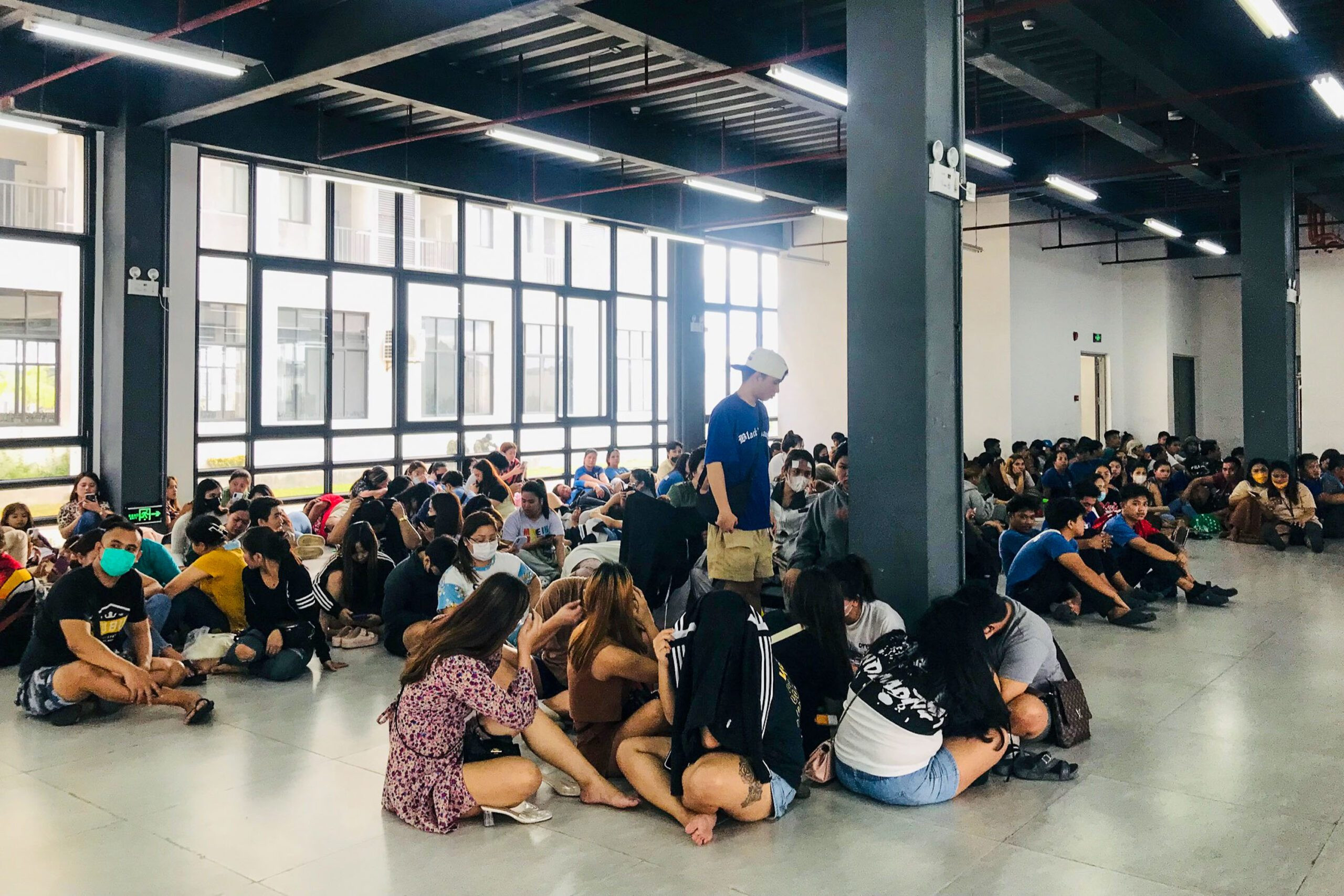Philippine authorities raided a suspected illegal online gaming and scam complex in Cebu province, and rescued more than 160 people who were committing internet-based crimes, reportedly under duress. The Presidential Anti-Organized Crime Commission (PAOCC) said yesterday that the raid on the Tourist Garden Resort in Lapu-Lapu City, Cebu, was carried out on Saturday morning by personnel from the National Bureau of Investigation, the Inter-Agency Council Against Trafficking, and the Department of Justice.
The raid came after the Indonesian Embassy in Manila requested the rescue of eight Indonesians who were reportedly forced to work for a Philippine offshore gaming operator (POGO) based in the resort. “There were three Indonesian nationals who escaped here July 21, then they sought the assistance of the embassy and the embassy informed us,” said PAOCC spokesperson Winston Casio.
According to the PAOCC, 162 foreign nationals “were found working in three separate scam farms within the compound.” This included 83 Chinese, 70 Indonesians, six Burmese, two Taiwanese, and one Malaysian. Authorities seized computers, mobile phones, and other electronic devices that are alleged to have been used for various types of online scams, including “pig butchering” romance scams, and fraudulent cryptocurrency investment schemes. “All foreign nationals will be brought to Manila to face inquest proceedings for violation of immigration laws,” PAOCC said in a subsequent statement.
The owner of the hotel compound was arrested and could face criminal complaints. “We will suggest to the authorities to file cases against resort owners who allow their properties to be used by illegal aliens in their covert operations,” said Bureau of Immigration Commissioner Norman Tansingco. “This will serve as a warning to those who might attempt to start illegal online gambling operations.”
The Rise and Fall of POGOs
While POGOs have been present in the Philippines for around two decades, they proliferated under President Rodrigo Duterte, who encouraged Chinese investment after coming to office in 2016. This growth has continued to expand in the two years since Marcos took office. Many POGOs have been linked with organized criminal activities, particularly sophisticated “pig butchering” scam operations that target victims across the globe.
In announcing the ban during his annual State of the Nation address in mid-July, Marcos alleged that POGOs have “ventured into illicit areas furthest from gaming such as financial scamming, money laundering, prostitution, human trafficking, kidnapping, brutal torture, even murder.” He added, “The grave abuse and disrespect to our system of laws must stop.”
The announcement has been followed by raids on several large operations where authorities suspect thousands of Chinese citizens and other foreign nationals, most of them from Southeast Asia, have been forced to carry out scams on pain of beatings, torture, and other mistreatment.
A Regional Problem
A similar pattern has been replicated in many parts of Southeast Asia, where online gambling operators pivoted to scam operations at the onset of the COVID-19 pandemic. In addition to the Philippines, scam operations have metastasized to an alarming degree in mainland Southeast Asia, particularly in parts of Myanmar, Laos, and Cambodia.
The United Nations reported last year that at least 120,000 people in Myanmar and at least 100,000 in Cambodia “may be held in situations where they are forced to carry out online scams.” It estimated that the region’s scam centers “generate revenue amounting to billions of U.S. dollars” per year.
A Transnational Threat
Underscoring the transnational nature of the scam epidemic, the pattern in each of these cases has been remarkably similar. Fraud factories are sustained by armies of indentured workers, most of whom were attracted by promises of clean and legitimate employment, only to be imprisoned and forced to operate various types of digital scams.
Crackdowns and Relocations
The Philippines is not the only nation currently promising to choke off the scam syndicates. In mid-August, the government of Laos ordered online scammers to vacate the Golden Triangle Special Economic Zone (GTSEZ), a known casino and scam hub in the country’s northwest, by August 25. Before and since the deadline, Lao and Chinese officials have launched a number of raids into the zone, an extraterritorial enclave run by a Chinese gangster-tycoon by the name of Zhao Wei.
As of August 12, the Lao authorities claimed to have arrested and deported 1,389 people involved in scam operations, including 1,211 Chinese nationals. In a subsequent raid in the GTSEZ on August 26, they arrested a further 60 Lao and Chinese nationals and reportedly shut down 16 scam operations. Radio Free Asia quoted one Lao police officer as saying that the law enforcement operation would “continue for many days.” Among those rescued in the recent raids on the GTSEZ, incidentally, were 125 workers from the Philippines, who have since been repatriated.
A Cat and Mouse Game
Whether these crackdowns make much of a dent in the billion-dollar bottom line of the transnational scam syndicates remains to be seen. These syndicates have shown a remarkable ability to pick up and shift their operations in response to crackdowns – and there is seemingly no shortage of jurisdictions willing to harbor them. An archipelago of special economic zones and casino developments has provided the supportive infrastructure for criminal activities of various sorts, and there are entire regions of Myanmar under the control of rebel groups and armed militias that have long played host to transnational criminal operations, if not directed engaging in this activity themselves. Meanwhile, scam operations continue to flourish in Cambodia, where there is considerable evidence that they enjoy the protection of prominent businesspeople and high-ranking government officials.
A Shifting Landscape
Sure enough, in a report this week, the Bangkok Post cited a border security source as saying that many online scam gangs in the GTSEZ had since relocated to Myanmar and Cambodia. Similarly, Frontier Myanmar reported recently that scam operators based in Shwe Kokko in Myanmar’s Karen State, close to the border with Thailand, have responded to a crackdown by migrating further south and re-establishing themselves near the Three Pagodas Pass border crossing. According to the report, they have done so with the aid and support of the Kayin Border Guard Force – the very force that ordered them to vacate Shwe Kokko earlier this year.
The Future of Scam Operations
The crackdown on online scam operations in Southeast Asia is ongoing, and it is difficult to say with any certainty whether these efforts will be successful. The syndicates are resilient and have deep roots in the region. However, the recent raids in the Philippines, Laos, and Myanmar, along with the growing international attention to this issue, are signs that the fight is far from over. It remains to be seen if the governments of the region are willing to make the necessary changes to their legal frameworks and law enforcement practices to effectively combat this transnational crime problem.
Conclusion: A Global Challenge
Online scams are a global problem, and the Southeast Asian region is a hotbed of activity. The recent crackdowns in the Philippines, Laos, and Myanmar are a welcome step, but it is clear that more needs to be done to dismantle these syndicates. International cooperation is essential to ensure that these criminals are brought to justice and their victims are protected.

















